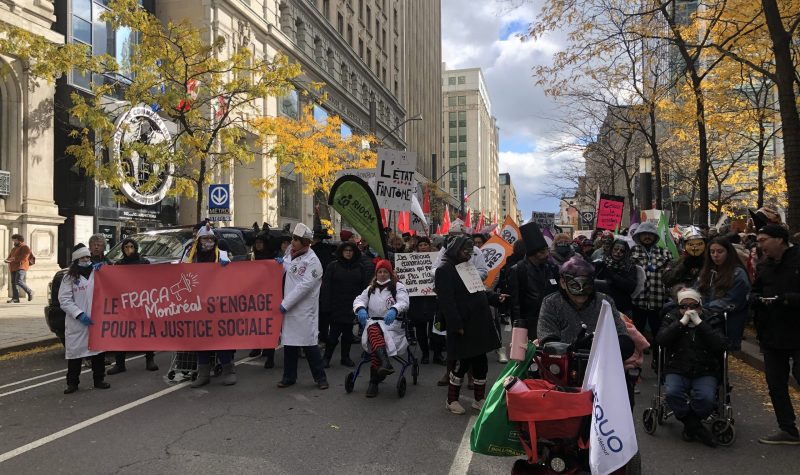Teachers made into zombies out of overwork, pallbearers holding a coffin for the public sector, and many masked imitators of Premier Francois Legault. This was the scene at Tuesday's Halloween protest against government cuts to social services.
Organizers from the Coalition Main Rouge say that the public and the workers who serve them are facing tough times, due in part to the policies of the Coalition Avenir Quebec government. This includes a slate of bills in education (Bills 23 and 40), housing (Bill 31), and healthcare (Bill 15), as well as a larger divestment from the social sector.
Local unions were out in force on Tuesday. Many will also take part in the Front Commun's Nov. 6 strike, an escalation of the bargaining process that has the overwhelming support of the coalition's 420,000 workers.
One such union is the Alliance of Professional Personnel and Technical Health and Social Services (APTS). Leonie Blanchette, president of the West-Central Montreal local, says workers are "fed up with the status quo."
"Our members are very tired. They're overworked, they're overbooked... they need support. They need better working conditions."
Adult education workers are also feeling the squeeze. Marie-Josée Desrochers and Geneviève Guernier of L’alliance des centres d’éducation populaire de Montréal (InterCEP) say their centres used to operate rent-free, but a 2017 change is now forcing them to pay.
When reached for comment, a representative from the Education Minister said that "school service centers own their buildings and are therefore responsible for the use they make of their buildings and the leases they enter into with their tenants."
They also said the government funds the centres through programs like the Programme d'action communautaire sur le terrain de l'éducation (PACTE), and that last year, adult education centres secured funds to cover rent through Soutien à des partenaires en éducation (SAP).
But Desrochers and Guernier say government underfunding of the service centres is what led them to start changing rent in the first place.
Now, every day spent fighting for funding is a day not spent on their core mission, says Desrochers. "Time we spend on this fight, we don't spend with our members, with the community."
That time with the community is more precious than ever for housing committee workers like Kay Lockyer, who says she's found herself doing more social work as a result of cuts.
As the housing tribunal and other services are still recovering from a COVID slowdown, she says community organizations like the Verdun Citizens' Action Committee (CACV) are forced to fill in the gaps.
"We're in crisis."
The Housing and Health Ministers did not provide a comment when contacted by CKUT.
This story has been updated to reflect comments from the Ministry of Housing.
Listen to the full story below:


